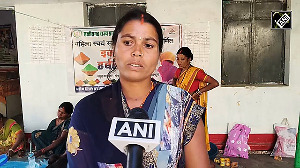Afghanistan President Hamid Karzai made a torrid attack on the Pakistani leadership in a face-to-face meeting with Prime Minister Yusuf Raza Gilani and demanded that Islamabad produce top Taliban leaders to negotiate with him.
Karzai confronted the Pakistanis at an official delegation-level talk on Thursday in Islamabad between the two countries on the sidelines of a trilateral summit meeting of Afghanistan, Pakistan and Iran, The Guardian reported on Friday.
The Afghan president's language and tone flared to such an extent that Gilani intervened and called a halt to a meeting of the full delegations of the two countries, the paper said, quoting officials on both sides.
After a break, a smaller meeting of just the top officials was held.
The Guardian said Karzai boiled over apparently at his frustration with the country he accuses of harbouring the Taliban. The Afghan president has long demanded that Pakistan bring the leadership of the Taliban to the negotiating table, including its chief, Mullah Mohammad Omar.
The Afghan side's main meeting was with the combined Pakistani civilian and military leadership, which went on for around three hours, with the Pakistani prime minister, foreign minister, army chief and head of the intelligence service all present.
At one point, apparently directing his remarks to Pakistan's Foreign Minister Hina Rabbani Khar, Karzai asked, "Would you be willing to stop girls studying in schools and
universities in Pakistan?"
The Taliban, when it ruled Afghanistan in the 1990s, stopped the education of girls and banned women from working.
According to one insider, Karzai also bluntly demanded that Pakistan produce the Taliban to negotiate with him during his visit to the country. The source said that the Pakistani side was shocked by the Afghan leader's aggression.
The nascent peace process, which offers the only hope for an end to the decade-long Afghan conflict, depends crucially on Afghanistan and Pakistan being able to co-operate.
Islamabad denies that the Taliban leadership and Mullah Omar is on its soil, but Kabul and the West believe that they have sanctuaries there, giving Islamabad decisive leverage over any negotiations.
Karzai is understood to deeply resent what he feels is his government's marginalisation in the peace dialogue, which he sees as being controlled by the US or Pakistan, despite both countries repeatedly saying they want an "Afghan-led" process.
US-backed efforts in recent months to open an office for the Taliban in the Gulf state of Qatar, to kick-start talks, was an initiative that Kabul felt excluded from.
Pakistan's relationship with Afghanistan is only just recovering from accusations last year that the Inter Services Intelligence was behind the assassination of Kabul's peace envoy Burhanuddin Rabbani.
Ahead of the Karzai visit, the Afghan ambassador in Islamabad, Umer Daudzai, a key adviser to the president, told a Pakistani newspaper, "President Hamid Karzai will expect Pakistan to facilitate contacts and dialogue with Taliban."
Pakistan says that it will aid Kabul's peace efforts but has never spelt out what it is capable of delivering. Conversely, Pakistan says that it is unclear what Karzai is demanding of it.
"We told them (the Afghan side) that you need to clarify what it is that you want," said Khar, while speaking to a small group of foreign press following the official meetings. "We need to understand each other much better."
"We will not block any process that works towards reconciliation," she said.
Khar described the discussions with the Afghan delegation as "hard" and "serious" but declined to go into any details. "We don't have Mullah Omar to bring," she said. "That's the crazy perception about Pakistan. It's ridiculous."







 © 2025
© 2025